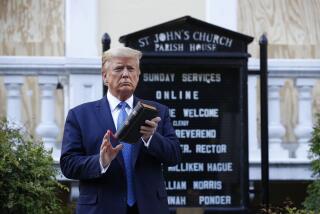Malling Christmas
MANY OF the most authentic expressions of religion are found in quiet decisions and unheralded acts. Tell me what you did yesterday and your plans for today and tomorrow, and I’ll have an idea of who and what you understand God to be.
That counts double for days fraught with special meaning.
So I’ve been wondering what to make of some pundits’ and politicians’ preemptive strike against what they call the “war on Christmas.” Even before I spotted the first plastic snowman on a neighbor’s lawn, these self-proclaimed defenders of the faith — using the media as a megaphone — pronounced Christmas under siege.
The enemy? Stores that replaced “Merry Christmas” with “Happy Holidays.” The strategy? Boycott the nonbelievers.
Shopping as spiritual warfare.
This is not a new development. Think back to the days following 9/11, when the president proclaimed shopping a patriotic duty. If we stopped spending and the economy tanked, the president said, the terrorists would win. If living well is the best revenge — and a new iPod or Prius tantamount to a slap in Osama bin Laden’s face — this form of civic service is apt.
If shopping serves our country’s cause, and God is on our country’s side, I can see how spending money becomes a religious activity. Put this way, there’s a case for patronizing religiously correct retailers — especially if you think your faith is under attack.
But the fight looks lopsided.
On one side is 80% of the population whose coreligionists dominate the three branches of the federal government. On the other is a handful of hipsters, intellectuals, risk-averse retailers and militant secularists. When one of them says, “season’s greetings,” will the Christian underpinnings of our society collapse?
The John Birch Society warned of the same danger in 1959. Its “keep Christ in Christmas” campaign reputedly unveiled a communist plot to sneak universalist messages into department stores’ holiday marketing.
A few decades later, the religious left launched its “reason for the season” campaign. Promoting good deeds over great deals, socially progressive Christians reminded the faithful that Scripture makes no mention of skates, or dollhouses as fundamental needs.
Our Puritan forefathers would have understood. They dispensed with Christmas — and its accompanying public drunkenness and bacchanalian displays — as a frivolous waste of time. As late as the 1850s, evangelicals were following the Puritan example, seeing none of the piety central to their faith in the rowdy street festivities that characterized Dec. 25.
Only through the evocative power of Clement Moore’s poetry, Thomas Nast’s drawings and John Wanamaker’s marketing did the Christmas we know take shape. Fulfilling childlike fantasies of jolly gift giving and a glittering marketplace, a booty-filled holiday overshadowed any religious message. “If you don’t believe in the Jesus Christmas,” my stepdaughter once asked, “couldn’t you celebrate the Santa Claus one?”
Which brings us to irony of today’s celebration.
Once upon a time, Christians understood Sunday to be the Lord’s Day — his house, their home, his people, their family. According to news accounts, some of the nation’s mega-churches — including Willow Creek outside Chicago, Mars Hill Bible in Grand Rapids, Mich., and Fellowship in Dallas —canceled today’s services so their members could spend the holiday at their own homes.
What would Jesus want? I cannot imagine. But I know that quiet decisions and unheralded acts are nurtured in community and sustained by a disciplined faith.
Like so many other spurious conflicts beloved of headline writers, the war on Christmas — like those on poverty, drugs and terrorism — deflects attention from real issues. What do we worship? Who is our family? How do we live out our beliefs?
Why is buying at the heart of the holiday?
We all should consider these questions. But shopping as spiritual warfare? In the words of one Christmas convert, “Bah, humbug!”
More to Read
Start your day right
Sign up for Essential California for news, features and recommendations from the L.A. Times and beyond in your inbox six days a week.
You may occasionally receive promotional content from the Los Angeles Times.






